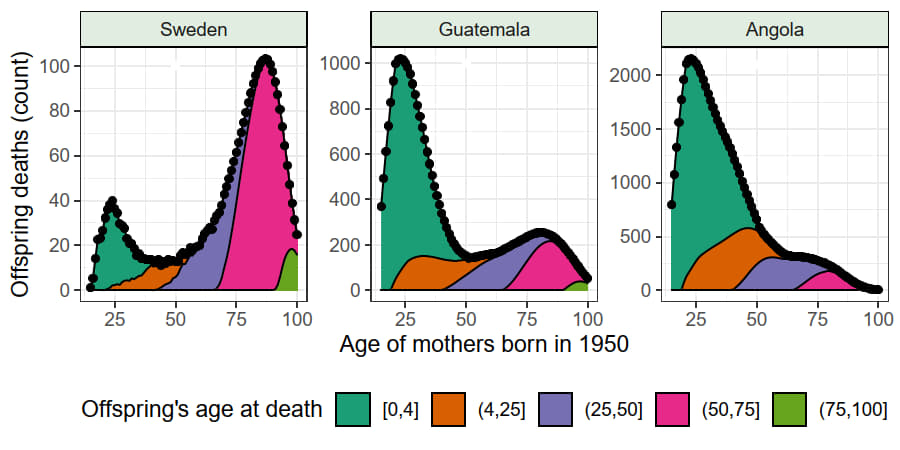Arbeitsbereich
Bevölkerungsdynamik und Nachhaltiges Wohlbefinden
Auf einen Blick
Projekte
Publikationen
Team
Projekt
Demographic Perspectives on Kin Availability and Kin Loss
Ugofilippo Basellini, Diego Alburez-Gutierrez, Emilio Zagheni, Carolina Coimbra Vieira, Liliana P. Calderón-Bernal, Mallika Snyder (University of California, Berkeley, Vereinigte Staaten), Ivan Williams (University of Buenos Aires, Argentinien)
In this project, we use different demographic methods and data sources to quantify the ways in which individuals acquire and lose kin throughout their lives and what this means for the availability of family resources over the life course. Ausführliche Beschreibung
Erwartete Zahl der Todesfälle von Nachkommen im Laufe des mütterlichen Lebens für Frauen, die 1950 in drei ausgewählten Ländern geboren wurden

Erwartete Zahl der Todesfälle von Nachkommen im Laufe des mütterlichen Lebens für Frauen, die 1950 in drei ausgewählten Ländern geboren wurden (schwarze Punkte, nicht kumulative Zählungen auf Bevölkerungsebene). Die farbigen Flächen zeigen das Alter der Nachkommen beim Tod. Der Verlust von Nachkommen konzentriert sich in Schweden auf das höhere Alter, während er in Guatemala und Angola jüngere Mütter betrifft (beachten Sie die unterschiedlichen y-Achsen in den einzelnen Feldern). © Alburez-Gutierrez, D.; Basellini, U.; Zagheni, E.: When do parents bury a child? Quantifying uncertainty in the parental age at offspring loss MPIDR Working Paper WP-2022-016. (2022)
Alterung, Sterblichkeit und Langlebigkeit, Demografischer Wandel, Historische Demografie, intergenerationelle Beziehungen, Lebensverlauf
Guatemala, Schweden, Welt
Publikationen
Alburez-Gutierrez, D.; Basellini, U.; Zagheni, E.:
Population Studies 79:1, 45–57. (2025)

Calderón-Bernal, L. P.; Alburez-Gutierrez, D.; Zagheni, E.:
MPIDR Working Paper WP-2023-034. (2023)

Alburez-Gutierrez, D.; Basellini, U.; Zagheni, E.:
MPIDR Working Paper WP-2022-016. (2022)

Chong, M.; Alburez-Gutierrez, D.; Alexander, M. J.; Zagheni, E.:
MPIDR Working Paper WP-2022-005. (2022)

Coimbra Vieira, C.; Alburez-Gutierrez, D.; Nepomuceno, M. R.; Theile, T.:
In: WebSci '22: proceedings of the 14th ACM Web Science Conference, Barcelona, Spain, 26-29 June 2022, 185–190. New York: Association for Computing Machinery (ACM). (2022)

Snyder, M.; Alburez-Gutierrez, D.; Williams, I.; Zagheni, E.:
Proceedings of the National Academy of Sciences of the United States of America 119:26, e2202686119–e2202686119. (2022)

Stelter, R.; Alburez-Gutierrez, D.:
Proceedings of the National Academy of Sciences of the United States of America 119:10, e2120455119–e2120455119. (2022)

Alburez-Gutierrez, D.; Kolk, M.; Zagheni, E.:
Demography 58:5, 1715–1735. (2021)

Alburez-Gutierrez, D.; Mason, C.; Zagheni, E.:
Population and Development Review 47:4, 997–1023. (2021)

Smith-Greenaway, E.; Alburez-Gutierrez, D.; Trinitapoli, J.; Zagheni, E.:
BMJ Global Health 6:4, e004837–e004837. (2021)

Williams, I.; Alburez-Gutierrez, D.:
MPIDR Working Paper WP-2021-001. (2021)

Williams, I.; Alburez-Gutierrez, D.; Song, X.; Caswell, H.:
Software. https://cran.r-project.org/web/packages/DemoKin/: CRAN. unpublished. (2021)